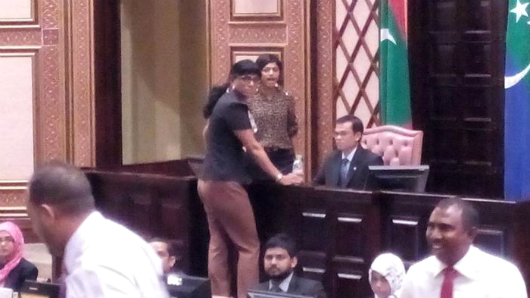The Majlis government oversight committee has demanded the ministry of education submit all relevant information regarding the removal of deputy principals from the schools.
Vice-Chair of the committee Maradhoo MP Ibrahim Shareef told local media that the letters demanding information will be sent today, with the ministry being given until tomorrow to submit the information. The committee also decided to summon serving deputy principals to clarify information.
The post of deputy principal has been abolished under a new organisational structure approved by the ministry for public schools. The ministry has said persons currently serving as deputy principals would be transferred to different posts in lieu of dismissal.
State Minister for Education Dr Abdulla Nazeer told state broadcaster Television Maldives last week that the change was intended to strengthen school management.
The decision came as a surprise to the 188 deputy principals in the country, with some telling media they were not previously informed of the decision, expressing shock upon hearing the news.
The opposition Maldivian Democratic Party (MDP) submitted the case to the government oversight committee, stating that the party wants to clarify the reasoning behind the decision and that the government could not dismiss civil servants without due process.
An unnamed deputy principal told Raajje.mv that they were offered two options by the ministry – either take up administrative or other relevant posts or be laid off with three month’s salary paid up front.
State Minister of Education Dr Abdulla Nazeer – while speaking to state television – said that the ministry’s aim was to eradicate the deputy principal level in the organisational structure in order to bring the principals closer to the teachers.
“The majority of the deputy principals are performing administrative level tasks at the school which should be done by administrative officers instead. We want to task the deputy principals with more academic related work,” said Nazeer.
The MDP severely criticised the government for its plans, however, stating that the decision was “inhumane” and “uncivilised”.
Speaking to Minivan News, former Education Minister Dr Musthafa Luthfee said that the government decision lacks any professional reasoning, speculating that it was taken to appoint more political figures to the ministry.
“Right now there are around 12 political figures at the education ministry therefore all the decisions regarding the education are made at a political level. This leads to problems because such decisions should be taken by educated academic professionals instead,” said Luthfee.
He also pointed out that, even though the deputy principals should have been contacted by the civil service commission regarding the issue, some were consulted through mobile phones and at cafes by political figures.
Deputy Minister of Law and Gender Aiminath Nadira said in a tweet that the decision would leave a lot of women in a vulnerable position (most deputy principals are women) and that the government needed to find a good alternative solution.
Luthfee also alleged that a circular was sent to the schools specifying that the chief guests for school-related events should only be brought after consultation with the ministry.
The MDP has also taken issue with the government’s spending plans for the education sector, which includes money for eight new political postings and over 2,000 new staff members.
Despite unrest among teachers this year, education minister Aiminath Shiham has said that the government has brought significant changes to the sector, including introducing Quran classes for the entire primary education and vocational training.
Around 90 percent of the teachers across the nation protested in September 21 by wearing black clothing to raise issues such as poor pay, inadequate protection of teachers, and the failure to grant the Teachers Association of Maldives (TAM) official recognition.
The government avoided a full on strike at the eleventh hour after sitting down with TAM and creating a timeline in which to meet the demands of teachers.
Related to this story
MDP says poorly prioritised 2015 education budget will lead to corruption
“Significant changes” brought to education sector, says minister
Teachers’ Black Sunday protest prompts government talks, strike decision pending
Teachers Association calls an indefinite strike on Tuesday

